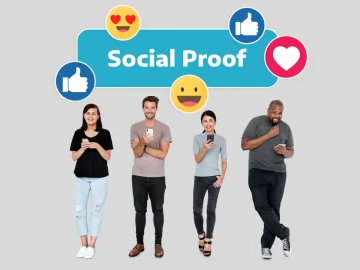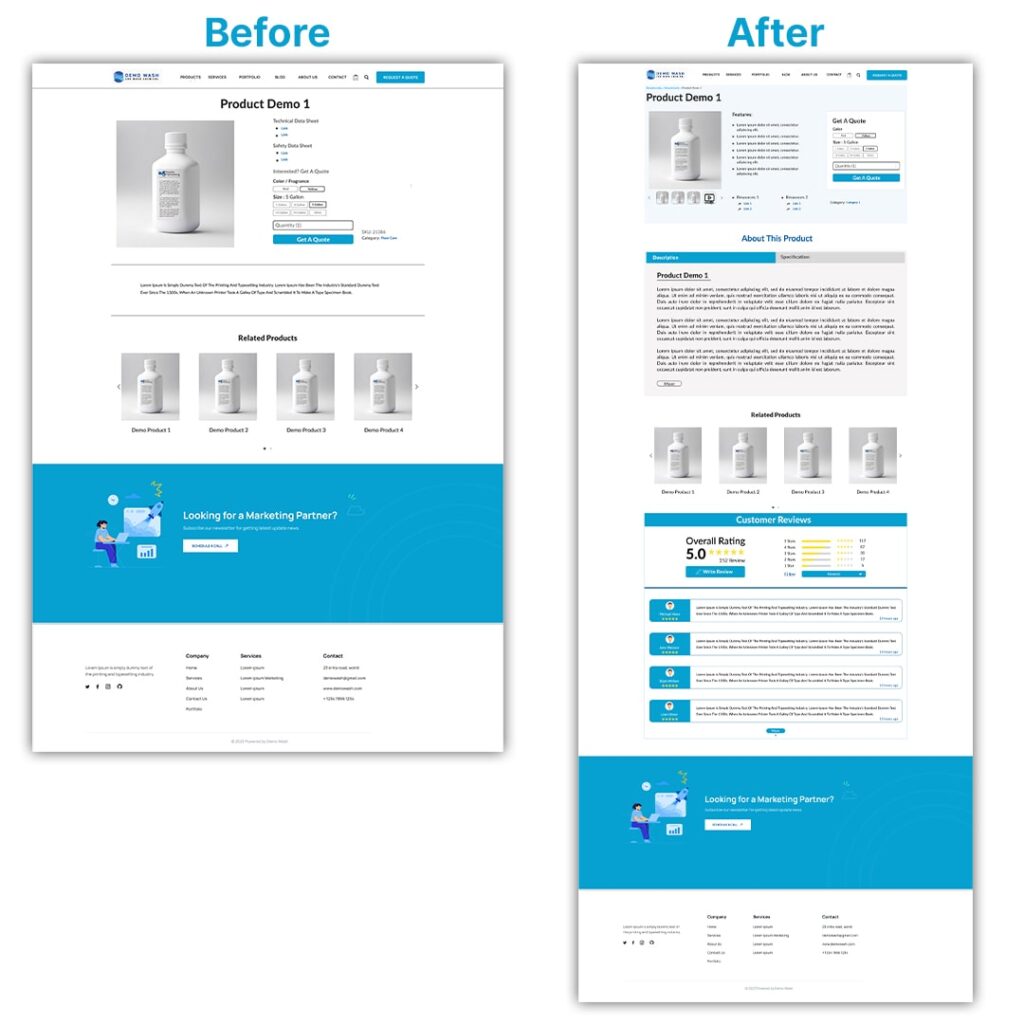In an age where choices are endless, making decisions can feel overwhelming. From selecting the perfect restaurant to choosing a reliable tech gadget, we often rely on the experiences, opinions, and recommendations of others to steer us in the right direction. This tendency to look to others for validation is called social proof, a psychological phenomenon where people assume the actions of others reflect the right behavior.
But what is social proof really? It’s more than just a marketing term; it’s a fundamental part of human behavior that marketers, businesses, and even individuals leverage to build trust and influence decisions. Think about the last time you made a big purchase – did you check reviews, ask for recommendations, or see if the product was popular? That’s social proof in action, helping to reassure us that we’re making a good choice.
This guide explores the question “What is social proof?” and explains why it’s such a powerful tool for brands to build credibility and boost sales. We’ll also explore the different types of social proof, the psychology behind it, practical ways to use it, and what the future holds for social proof marketing.

What is Social Proof and Why Does It Matter?
Social proof isn’t just a marketing gimmick; it’s a social phenomenon rooted in psychology. So, why does social proof matter so much?
In essence, social proof is a shortcut. In a world of information overload, it gives people an easy way to decide what’s trustworthy. Rather than meticulously weighing every option, people often look to others to help them make their choices. If other people approve of something, we’re more likely to feel it’s the right decision.
Here are the primary reasons why social proof matters in today’s marketplace:
Builds Trust in a Skeptical World: With online shopping, trust can be hard to establish. Social proof creates a bridge between the brand and potential buyers by providing validation from other customers or experts.
Boosts Brand Credibility: Brands face fierce competition, and trust isn’t always easy to earn. Social proof, such as endorsements, reviews, or customer testimonials, helps build credibility. Potential customers can see that others have trusted the brand, easing their concerns about trying it themselves.
Reduces Decision-Making Stress: Decision fatigue is real. Every choice we make takes mental energy, and people prefer easy paths to a confident decision. Social proof simplifies the process, allowing consumers to quickly assess whether a product is worth purchasing.
In a world where consumers are naturally wary, social proof serves as a powerful trust-builder. When potential customers see others buying, enjoying, and recommending a product, they feel more assured, which translates into higher sales and loyalty.
The Role of Social Proof in Marketing
First things first—What is social proof? It’s more than just a marketing tactic; it’s one of the most powerful ways to persuade people. To understand social proof marketing, think about the ways you’ve likely encountered social proof without even realizing it.
When brands use social proof effectively, they’re saying to potential customers, “Look at what others are saying – they love us, and so will you.” Whether through reviews, testimonials, endorsements, or customer milestones, social proof instills confidence and provides validation. Here’s why social proof marketing is so impactful:
It Enhances Credibility: When potential buyers see that others have invested in a product, it builds trust. Brands can use various types of social proof, like expert endorsements, to demonstrate credibility and encourage trust in their product.

It Drives Conversions: Social proof creates momentum, nudging potential customers toward making a purchase. Statistics have shown that websites featuring customer testimonials can see conversion rates jump as much as 34%.
It’s Highly Scalable: Unlike traditional advertising, which requires ongoing investment, social proof can continue to work for a brand passively. Reviews, for example, stay on a product page, contributing to the brand’s credibility over time without additional costs.
Amplifies Word-of-Mouth: Social proof helps extend word-of-mouth to a larger audience. Online reviews, ratings, and testimonials are essentially word-of-mouth on a larger scale, making them a valuable form of social proof.
From testimonials and ratings on websites to user-generated content on social media, social proof marketing taps into the wisdom of the crowd, creating a magnetic pull that draws in potential customers.
The Psychology Behind Social Proof
Social proof works not only because of clever marketing but also because it taps into basic human psychology. To succeed in marketing, you need to understand how people make buying decisions. Social media is a huge part of marketing today, but to see its true impact, you have to ask one key question: what is social proof? Let’s look at the main psychological forces behind social proof:
The Need for Social Validation: Humans are social creatures, and we inherently want to belong. When people around us approve of a product, service, or behavior, we feel more comfortable adopting it ourselves. Social proof provides a sense of community and validation, which can be comforting for consumers.
The Desire to Reduce Uncertainty: Choices are easier when there’s an indicator that others have made the same decision and are satisfied with it. When people are uncertain, they often follow the crowd to avoid making a potentially bad decision. In marketing, social proof leverages this tendency by reassuring customers that the brand or product is worth their attention.

Authority Bias: People trust authoritative figures. When an expert or influencer endorses a product, it holds weight because the audience perceives that person as knowledgeable and credible. This is why expert reviews and endorsements are particularly effective.
Fear of Missing Out (FOMO): This psychological phenomenon drives a lot of consumer behavior. Social proof often plays into FOMO by showing people what they might be missing out on, particularly on social media. Seeing others enjoy a product or experience creates an urgency to join in, driving purchases.
By understanding these psychological underpinnings, brands can craft marketing strategies that resonate with people on a deep level, building connections that are hard to replicate with other tactics.
Common Types of Social Proof
Not all social proof is the same; each type offers a unique angle and serves a different purpose. Here are the most common types of social proof and how they’re used effectively:
Expert Social Proof: When experts in a field endorse a product, it gives that product instant credibility. Think about skincare brands endorsed by dermatologists or tech gadgets reviewed by engineers. Expert social proof is highly effective in industries where trust and authority are essential.
Celebrity Social Proof: When celebrities endorse a product, it adds a sense of glamor and appeal. A recommendation from a beloved star can attract fans and lend an air of exclusivity to the product. This type of social proof is especially common in fashion, beauty, and lifestyle brands.
User Social Proof: Customer reviews, ratings, and testimonials are some of the most trusted forms of social proof. When potential customers see that others are satisfied, they feel more confident buying the product themselves. Reviews and ratings, especially on e-commerce sites, are crucial for consumer trust.
Crowd Social Proof: This type is especially effective in highlighting popularity. When brands display that a product is a “Best Seller” or has a high number of purchases, it communicates that many people have found value in it. Crowd social proof works well for items that have high turnover or mainstream appeal.
Friends and Family Social Proof: We naturally trust those closest to us, so recommendations from friends and family can have a profound impact. This is why referral programs and “share with a friend” offers can be highly successful, especially in service-based or subscription models.

Each of these types offers distinct benefits in answering what is social proof and how it varies. Brands can experiment with various forms to find out what resonates best with their audience, increasing trust and conversions along the way.
How Social Proof Impacts Consumer Behavior
The influence of consumer social proof on behavior is far-reaching. Social proof not only affects whether people buy a product but also how much they’re willing to spend and how quickly they make a decision. Here’s a breakdown of the behavioral impact of social proof:
Instills Confidence in the Buying Decision: One of the most significant impacts of social proof is increased confidence. When people see others buying or recommending a product, it reassures them that they’re making a smart choice.
Speeds Up Decision-Making: Social proof reduces hesitation. When potential customers see positive reviews or know that a product is a best-seller, they’re less likely to second-guess their decision.
Increases Willingness to Spend More: Social proof can drive not only purchases but also the value of those purchases. When people see others investing in a high-quality product, they’re more inclined to spend more themselves.
Creates a Sense of Urgency: The fear of missing out is a powerful motivator. Social proof, especially in the form of limited stock alerts or trending items, taps into FOMO and prompts quicker purchases.
This ability to influence buying decisions so deeply makes social proof a cornerstone of effective marketing, as it helps guide consumers toward confident purchases.
Practical Tips for Using Social Proof in Marketing
Harnessing social proof effectively can make a tangible difference in conversions and brand perception. If you want to boost your marketing with social proof, it helps to start by asking, what is social proof? Once you know, these simple tips can make it work for you. Here are practical tips for using social proof in marketing:
Prominently Display Customer Reviews and Ratings: On product pages, feature strong reviews and ratings. Websites with high-quality testimonials often have significantly higher conversions than those without.
Highlight Endorsements from Experts or Influencers: When working with credible influencers or experts, ensure their endorsements are visible on your website and social channels. This type of social proof is especially valuable for brands in specialized fields, like tech or health.

Incorporate User-Generated Content (UGC): Encourage customers to share their experiences with your product on social media, creating an authentic form of social proof. UGC fosters a sense of community and authenticity.
Use Trust Badges and Certifications: Including badges like “Top Rated” or “Verified Buyer” can signal authenticity and boost trust. Trust badges can be particularly reassuring for new customers.
Leverage Social Media to Build Popularity: Use social proof on social media by sharing customer stories, tagging users, and showcasing user-generated content. This lets potential customers see how popular your brand is and makes it feel more accessible.
Create Scarcity Through Limited Stock Alerts: When items are low in stock, consider showing this information to create urgency. Limited stock can encourage hesitant customers to make a faster decision.
These strategies help you incorporate social proof seamlessly into your brand, creating a stronger connection with customers and a more trustworthy reputation.
How to Measure the Impact of Social Proof
Understanding how to measure social proof is key to improving your strategy. But let’s start with the basics. What is social proof? It’s the idea that people are influenced by others’ actions and opinions. If you don’t know how social proof affects your marketing, you might miss out on its true value. Here’s a simple guide to help you measure it in ways that matter:
Conversion Rate Changes: The ultimate goal of social proof is to drive conversions. Track changes in conversion rates before and after adding social proof elements, like testimonials, reviews, or trust badges.
Engagement on Social Media: For social proof of social media engagement, measure likes, shares, and comments. High engagement indicates that people are responding positively to the content and feeling a connection with your brand.
Bounce Rate on Key Pages: Pages featuring social proof, such as reviews or influencer endorsements, should see a lower bounce rate if the social proof is effectively building trust.
Click-Through Rate (CTR) on Endorsements: Track the CTR of any endorsement links you share, particularly if you’re running influencer campaigns or featuring social proof in email marketing.
Customer Feedback and Surveys: Sometimes, direct feedback from customers can reveal insights about your social proof strategy. Survey customers on what made them trust your brand and note the responses related to social proof.

By evaluating these metrics, you can gain a clear picture of which types of social proof work best for your brand and where there’s room for improvement.
Mistakes to Avoid When Using Social Proof
While social proof is powerful, misusing it can harm your brand. Avoid these common social proof mistakes to keep credibility high:
Using Inauthentic Testimonials: Fake or overly polished testimonials can backfire. Authenticity is key, so ensure your testimonials reflect genuine customer experiences.
Overwhelming with Too Many Reviews: Avoid filling a page with hundreds of reviews, which can feel cluttered. Instead, select the most compelling and diverse testimonials.
Ignoring Negative Reviews: Transparency is essential. Address negative reviews professionally rather than ignoring them, as it shows customers that you’re open to feedback.

Focusing Only on Positive Social Proof: Balance is essential. A small amount of constructive criticism can enhance authenticity, while only showing perfect reviews may seem unrealistic.
Avoiding these mistakes helps maintain the trustworthiness and effectiveness of your social proof.
Future Trends in Social Proof Marketing
Social proof is evolving as technology and consumer behavior change. Here’s what’s next in social proof trends:
Video and Interactive Testimonials: Video content is increasingly popular, with video testimonials adding a layer of authenticity that text can’t match. Interactive testimonials, where viewers can engage directly, may also become more prominent.
Personalized Social Proof with AI: Artificial intelligence can tailor social proof to individual viewers, displaying testimonials or endorsements most relevant to their interests.
Real-Time Social Proof Pop-Ups: Live notifications showing recent purchases or current views create a sense of activity and social validation.
Integration with Social Platforms: Social media marketing is becoming a cornerstone for social proof, with platforms like Instagram and TikTok enabling businesses to showcase user-generated content.

Staying updated with these trends can help brands keep their social proof strategy fresh and relevant.
Conclusion
In a digital world filled with endless options, social proof has become a powerful tool for guiding consumer decisions, bridging the gap between brand and customer in ways traditional marketing rarely can.
By leveraging the experiences, endorsements, and feedback of others, brands tap into the natural human desire for validation, security, and trust in their choices.
As we explore in this guide, what is social proof? It’s not just a collection of positive reviews; it’s much more than that. it’s a nuanced approach that combines psychology with marketing to create a sense of community and shared experience around a brand.
From testimonials and expert endorsements to real-time user interactions and feedback, social proof offers businesses a robust roadmap for building trust, increasing engagement, and ultimately driving more sales.
By measuring and refining their social proof strategies, brands can gain insights into what resonates most with their audience, empowering them to fine-tune their marketing for maximum impact.
This builds credibility and provides customers with the confidence to make informed decisions, often shortening the buyer journey and enhancing overall satisfaction.
Looking to the future, brands that understand and adapt their social proof strategies will continue to thrive, building stronger, more authentic connections with their audiences.
As digital marketing trends evolve, so too will the tools and approaches for leveraging social proof, making it essential for marketers to stay flexible, creative, and in tune with their audience’s needs.
What is social proof? It’s not just a marketing trick; it’s a key way for brands to earn trust and connect with today’s consumers. People look for signs they can rely on—like reviews, testimonials, and real-life examples—before they buy. Social proof gives them the confidence they need to choose you.
For those looking to build loyalty, cultivate lasting relationships, and create memorable brand experiences, social proof isn’t just an option – it’s an essential part of a sustainable marketing toolkit.








